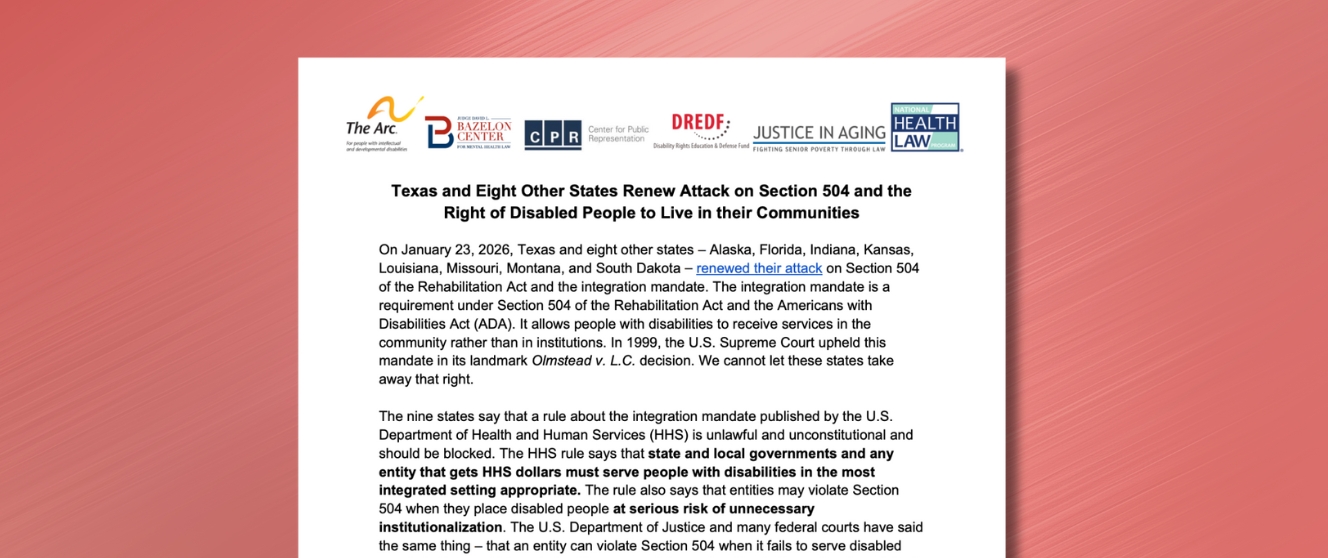
June 2020
Produced by: Disability Rights California, Disability Rights Education and Defense Fund, Justice in Aging, Independent Living Resource Center San Francisco, and Fat Legal Advocacy, Rights, & Education
During COVID-19, hospitals may not have enough beds and supplies to help everyone who needs it. Hospitals may not have enough ventilators for everyone who needs one. Doctors may have to make decisions about who gets help.
On June 9, 2020, California put up a document to tell hospitals how to plan for this and try to make sure they have enough beds and supplies. The document tells hospitals how to make decisions about who gets help if there is not enough for everyone.
No Discrimination
The document says that hospitals and doctors have to follow federal and state laws against discrimination, even if there is a crisis. The document says that doctors and hospitals cannot decide about treating you based on:
- Your age
- Your race
- If you have a disability
This includes a disability related to weight, a chronic medical condition, or any disability - Your gender
This means if you are a man or a woman or nonbinary - Your sexual orientation
This includes if you are gay, straight, lesbian, or bisexual - Your gender identity
This includes if you are trans or transgender - Your ethnicity or your national origin
This includes if you are Hispanic or Latinx, if you speak a different language, or if you or your family came from a different country - Ability to pay
This means if you can pay the hospital bill - Your weight or size
This includes if you are big, small, fat, thin, short, or tall - Your socioeconomic status
This includes how much money you have, where you live, if you went to college, or what your job is - Your insurance status
This means if you have health insurance or not - Your perceived worth or your perceived quality of life
This includes what other people think about your life or your body - Your immigration status
This includes if you are a citizen or if you are not a citizen
This includes if you have papers to be in the United States or if you don’t have papers - Your incarceration status
This includes if you are in jail or prison, or if you have been in jail or prison - If you are homeless
Your past or future use of resources
This includes if you have been in the hospital a lot in the past or if you might be in the hospital a lot in the future
Preventing a Crisis
The document tells hospitals that they must work hard to get the supplies that they need to help everyone who needs it. The hospitals must talk to each other and work together to try to help everyone. So far, the hospitals in California have been able to help everyone who needs it.
How Hospitals and Doctors Decide Who Gets Help In a Crisis
The document tells hospitals and doctors how to make decisions if there are not enough beds and supplies to help everyone who needs it. In that situation, the document says that hospitals and doctors should try to save the most lives. This means that the hospitals and doctors should help people based on who will probably get better with treatment. The document says that doctors must look at you personally and look at all the medical facts to decide if you will probably get better with treatment.
The document tells doctors that they can use a test called SOFA (Sequential Organ Failure Assessment) to help them decide. The SOFA test tries to measure if you will probably get better with treatment. The lower your SOFA score, the more likely you are to get better with treatment.
If you have a disability, your disability can raise your SOFA score. If that happens, the document says that the doctors should lower your score so your disability does not count against you. For example, it should not count against you if your disability:
- Limits how you move or talk;
- Limits your breathing, particularly if you have not had access to tools that help you breath;
- Causes low blood pressure, or causes changes in your blood tests, particularly if you have not had access to your medications.
The document tells doctors that they can put people with similar SOFA scores in the same “priority group” for help. If there are not enough beds and supplies to help everyone, the doctors can decide who to help based on the priority groups.
If the doctors cannot help everyone in the same priority group, the document says that they can look at whether anyone in the group has a severe condition that is likely to cause death soon. An example is cancer where the person is expected to die within six months even with treatment. If there is not enough to help everyone, the document says that the doctors can decide to help people who do not have that kind of severe condition that is likely to cause death soon. If the doctors still have too many people to treat, the document says they can use a lottery to decide.
You might want to keep a paper with you with information about your disability. The paper could include how your disability might raise your SOFA score. It could include information about medications and equipment that you need to stay well. It could include what your regular doctor thinks about how long you will live. It could include contact information for a support person. You can keep the paper with you in case it is hard to communicate when you are at the hospital. You might want to bring a support person with you to the hospital.
Reasonable Changes to Hospital Rules
Under law, hospitals and doctors have to make reasonable changes to rules so patients who are older adults or have a disability can get the help they need. They have to make changes even during COVID-19. The document gives some examples:
- Changes to COVID-19 visitor limits so you can have a family member, personal care person, communicator, or other helper with you in the hospital. More information.
- Making sure you have effective communication, such as sign language or real-time captioning. Hospitals must also provide language help if needed.
- Changes to ensure equal treatment in decisions about who gets help, such as changes to SOFA scores and longer time on a ventilator, to account for disabilities.
The document says that hospitals should have a staff person assigned to make sure the needed changes are provided.
Personal Ventilators
If you use a ventilator of any kind, and you bring your personal ventilator to the hospital, your personal ventilator cannot be taken away from you and given to other patients.
If You Disagree With a Decision About Who Gets Treatment
If you or your family or supporter disagrees with a decision about your care, such as a decision to stop or deny you certain treatment, you may appeal. To appeal, you or your advocate should tell the doctors that you disagree with the decision and say why. You can appeal because you think that the decision is based on your age, race, weight, size, or disability. You cannot appeal just because you do not think the hospital should be making these kinds of decisions or do not like how the hospital makes its overall decisions.
The document says a separate group of people should decide your appeal. A health care decision should be changed if it is based on age, race, weight, size, or disability, or any other quality on the list at the beginning. A decision on your appeal must be made quickly enough to avoid harm to you or other people waiting for treatment.
WE ARE HERE TO HELP
We are here to help. If you or someone you know cannot get hospital treatment during COVID-19, please contact us.
Disability Rights California
Phone: 1-800-776-5746
https://www.disabilityrightsca.org/contact-us/how-to-get-help
Disability Rights Education and Defense Fund
Phone: (510) 644-2555
Email: info@dredf.org
Justice in Aging
Website: https://www.justiceinaging.org/contact
Independent Living Resource Center San Francisco (for individuals in or near San Francisco)
Phone: 628-231-2287
Email: brandie@ilrcsf.org

